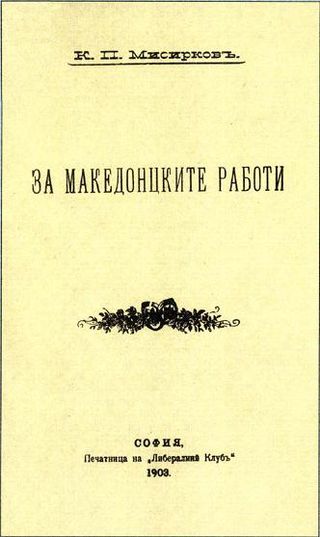Top Qs
Timeline
Chat
Perspective
On Macedonian Matters
1903 book by Krste Misirkov From Wikipedia, the free encyclopedia
Remove ads
Za makedonckite raboti (Cyrillic script: За македонцките работи, English translation: On Macedonian Matters) is a book written by Krste Misirkov and published in 1903 in Sofia, Bulgaria. The book presents the author's views towards the Macedonian Question, and explores the sense of national belonging and nеed for affirmation of the Macedonians as a separate people. The book marked the first complete outline of Macedonian as a separate language and proposed the need for its codification. The book also covers the rules of the standard language, its orthography and alphabet.
Remove ads
Background
Summarize
Perspective
Za makedonckite raboti marked the first attempt to formalize a separate Macedonian literary language.[1] With the book, Misirkov outlined an overview of the Macedonian grammar and expressed the ultimate goal of codifying the language and using it as the language of instruction in the education system. The author proposed to use the west-central Macedonian dialects (Prilep-Bitola, Kičevo-Poreče and Skopje-Veles) as a dialectal basis for the formation of the Macedonian standard language. His ideas however were not adopted until the 1940s.[2][3] Misirkov appealed to the Ottoman authorities for eventual recognition of a separate Macedonian nation. However, he admitted there was not such one, as most of the Macedonian Slavs have been called Bulgarians, but it should be created, when the necessary historical circumstances would arise.[4][5][6][7][8][9] He also claimed that the Byzantine Greeks renamed the Bulgarian and Macedonian Slavs into "Bulgarians" because of their alliance with the Bulgars, during the incessant Byzantine–Bulgarian conflict, which in the eyes of the Byzantines eventually forged Slavs and Bulgars into one people with a Bulgarian name and a Slavonic language.[10] Misirkov wrote that one of the primary goals of the Macedonian intelligentsia should be to drive out the national and religious Serbian, Bulgarian and Greek propaganda from Macedonia, otherwise they would eventually lead to its partition. He wrote that only an energetic fight against Greece, Serbia and Bulgaria could save Macedonia from annihilation, and only a separate Macedonian national self-awareness can give the moral right to fight against the partition.[11][12][13][14][15]
Printing history
In November 1903 Misirkov arrived from Russia in Sofia for the purpose of printing his book, which was published at the end of the year. Most copies were confiscated or destroyed by the Bulgarian police and Internal Macedonian-Adrianople Revolutionary Organization (IMARO) activists, shortly after the book was published.[16] Because of this at his own time, the book had little or no impact and did not become popular until the middle of the 1940s.[17] Misirkov arrived in Belgrade in December, where he met with Stojan Novaković, at that time a Serbian foreign minister.[18] From his book, Novaković ordered the purchase of 50 pieces by the Serbian Diplomatic Agency in Sofia.[19] The purchased exemplars were shipped through Serbian diplomatic channels to Ottoman Macedonia.
Aftermath
In 1905, Misirkov returned to a pro-Bulgarian stance and renounced the positions he espoused in On Macedonian Matters.[20][21] Also, he published a series of articles in the IMARO press written from a Bulgarian nationalist perspective,[22] claiming Bulgarian identity for himself and the Macedonian Slavs.[23][24] He would return to the Macedonian national ideas especially in the 1920s, at a time that was bound to receive a much more favorable reaction by the public.[20][25] However, at the very end of his life, Misirkov advocated again Bulgarian identity for the Macedonian Slavs as a choice preferable to Serbian.[26][27]
Remove ads
Legacy
Although the language planners involved in the codification of standard literary Macedonian in 1944 were not familiar of Misirkov's book, since most of the copies of it were destroyed, they were familiar with Misirkov's historical legacy. Hence, the west-central Macedonian dialectal basis proposed by Misirkov is the same to that of the present-day standard Macedonian.[28][29]
The book was reprinted in 1946, from a copy found by Kole Nedelkovski in the Sofia public library, and it became permanently cited by the Macedonian historians as an indication of the existence of a separate Macedonian ethnicity at Misirkov's time.[30][17]
Remove ads
Gallery
- A letter from the Serbian embassy in Sofia to the Ministry of Foreign Affairs of Serbia, regarding purchasing of 50 copies of Misirkov's book.
- In 1907, in the introduction to his article "Notes on South Slavic Philology and History", Misirkov rejected the ideas of his 1903 book.
- Misirkov's On the Macedonian Matters commemorated as one of the key points of Macedonia's history, at the Makedonium memorial in Kruševo
Notes
References
External links
Wikiwand - on
Seamless Wikipedia browsing. On steroids.
Remove ads




